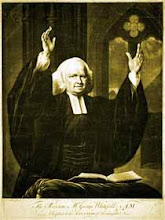
"omnipotence and foreknowledge of God, I repeat, utterly destroy the doctrine of 'free-will'...doubtless it gives the greatest possible offense to common sense or natural reason, that God, Who is proclaimed as being full of mercy and goodness, and so on, should of His own mere will abandon, harden and damn men, as though He delighted in the sins and great eternal torments of such poor wretches. it seems an iniquitous, cruel, intolerable thought to think of God; and it is this that has been such a stumbling block to so many great men down through the ages. And who would not stumble at it? I have stumbled at it myself more than once, down to the deepest pit of despair, so that I wished I had never been made a man. (That was before I knew how health-giving that despair was, and how close to grace.)" Luther BW pg. 217
Now, since on God's own testimony, men are 'flesh', they can savour of nothing but the flesh; therefore 'free-will can avail only to sin. And if, while the Spirit of God is calling and teaching among them, they go from bad to worse, what could they do when left to themselves, without the Spirit of God? Your [Erasmus] observation that Moses is speaking of the men of that age is not to the point at all. The same is true of all men, for all are 'flesh'; as Christ says, 'That which is born of the flesh is flesh' (john 3:6) How grave a defect this is, He Himself there teaches, when he says: 'Except a man be born again, he cannot enter the kingdom of God (v. 5)...I call a man ungodly if he is without the Spirit of God; for Scripture says that the Spirit is given to justify the ungodly. As Christ distinguished the Spirit from the flesh, saying: "that which is born of the flesh is flesh', and adds that which is born of the flesh cannot enter the kingdom of God', it obviously follows that whatever is flesh is ungodly, under God's wrath, and a stranger to His kingdom. And if it is a stranger to God's kingdom and Spirit, it follows of necessity that it is under the kingdom and spirit of Satan. For there is no middle kingdom between the kingdom of God and the Kingdom of Satan, which are ever at war with each other. 241, 253
And again: "He came unto his own, and His own received Him not. (v. 11)"The law indicates the impotence of man and the saving power of God..."if any man will come after me': 'he that wills to save his life'; 'if ye love me'; 'if ye shall continue'. In sum, as I have said-let every occurrence of the conjunction 'if', and all imperative verbs, be collected together (so we may help the Diatribe...) [indicating that all commands to believe or follow Christ are conditional, not stating man's ability]










No comments:
Post a Comment